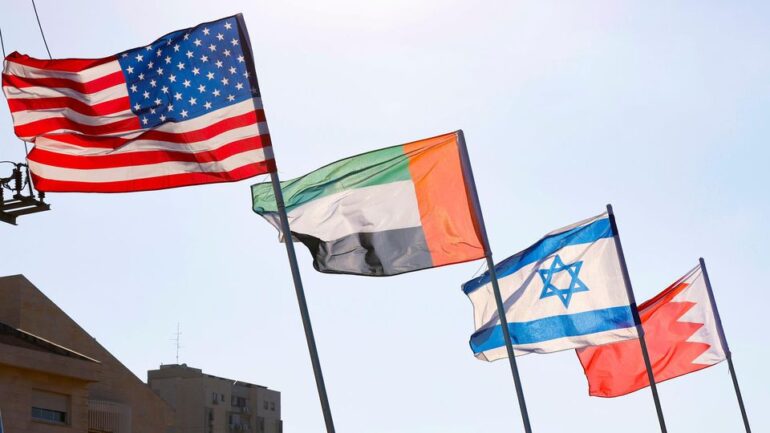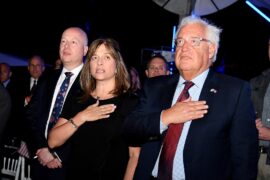Prime Minister Binyamin Netanyahu (Likud) landed in Washington on Monday, where he is expected to participate in a White House ceremony for United States President Donald Trump’s “Abraham Accords.”
Netanyahu emphasized to journalists the historic nature of his trip, in which he is scheduled to sign agreements on Tuesday with the United Arab Emirates and the Kingdom of Bahrain, only four days after it was announced that the latter would participate in the accords.
The White House released a statement last Friday, announcing the establishment of full diplomatic relations between the State of Israel and Bahrain.
“This is a historic breakthrough to further peace in the Middle East,” the statement said.
“Opening direct dialogue and ties between these two dynamic societies and advanced economies will continue the positive transformation of the Middle East and increase stability, security, and prosperity in the region.”
Following Friday’s announcement, Netanyahu published a video emphasizing the success of his approach to attaining regional peace.
“It took us 26 years since the second peace agreement with an Arab state to reach a third peace agreement, and it took us not 26 years but 29 days to reach a peace agreement with a fourth Arab state and there will be more,” Netanyahu said in the video.
“This is a new era of peace,” he added. “Peace for peace. Economy for economy.”
Trump, meanwhile, hailed the Israel-Bahrain agreement on Twitter as a “historic breakthrough.”
“Another HISTORIC breakthrough today! Our two GREAT friends Israel and the Kingdom of Bahrain agree to a Peace Deal – the second Arab country to make peace with Israel in 30 days!” he tweeted.
According to a Monday morning report in Yisrael Hayom that quoted multiple regional diplomats, Oman is now expected to also establish formal diplomatic relations with Israel.
While what appears to be a rapid series of US-brokered peace agreements between Israel and various Arab states in the region has caught many political figures and analysts off guard, it’s important to carefully examine what’s taking place and where it could lead.
The first major player to look at is of course Donald Trump himself. Being a highly divisive election year in an increasingly polarized United States, Trump is clearly looking to bolster his own image as an effective statesman and leader on the global stage.
In addition to the political damage caused by the coronavirus pandemic and racial justice protests across the US during this crucial election cycle, the Trump administration suffered a major setback when its two-state “Deal of the Century” was met with unexpected opposition from Jewish nationalists unwilling to accept the deal’s plan to take 70% of the West Bank from Israel.
As Trump’s presidency has been styled by instincts and behavior that likely achieved his interests in business and entertainment, the Abraham Accords should be seen as the US president raising the stakes on his designs for the Semitic region.
While it might appear for the time being that the Fatah-led Palestinian Authority is being left behind as one Arab nation after another announces that it will normalize relations with Israel before Palestinian issues are even addressed, it might not be the PA but only its current leadership that’s losing most of its political leverage and support.
It should be obvious that every state who will eventually become part of the Abraham Accords are likely already signed on from the beginning. Being the showman that he is, Trump has been very clever to build momentum and the illusion of a regional domino effect by pacing the announcement of each partner to the accords.
As sensational as announcing a regional deal between Israel and several other Semitic nations might have been, the media would have likely moved on to less flattering stories ahead of elections in November. Announcing the partners to the accords one by one over time creates the impression of a series of major diplomatic successes rather than one giant success, giving Trump’s administration a critical tool for retaking control of the news cycle whenever necessary.
Another important feature of the accords are the increased US weapons sales to the Semitic region likely to result. Despite Trump’s recent public squabbling with the military industrial complex, he obviously recognizes the value in one of America’s last major domestic industries gaining oil-rich Gulf states as high level clients.
Although the UAE and others have been cooperating with Israel behind the scenes for years, a regional taboo still prevented open diplomatic relations. Trump was able to break this taboo by encouraging relevant national leaders to take the risk of doing publicly what they’ve anyway been doing privately. He accomplished this simply by projecting sufficient strength and assuring the relevant players that they could trust in his protection, making their regimes increasingly dependent on US power.
While Prime Minister Netanyahu has been using the dramatic accords to distract from his government’s mishandling of the coronavirus pandemic, as well as his personal legal challenges, he seems to at least on the face of things be achieving something akin to former political rival Shimon Peres’s neoliberal “New Middle East” vision – just without having to surrender any of the territory Peres thought necessary.
Netanyahu has been touting his “peace for peace” formula to the public while keeping the details of the accords close to his vest. One point of contention that has already come up has been the sale of Lockheed Martin’s F-35 fighter jets to the UAE. Although Netanyahu had initially denied that an agreement with Israel would green light the UAE to purchase the F-35s, it has since become clear that the emirates will in fact receive the jets, fostering concern around Jerusalem’s ability to maintain its so-called Qualitative Military Edge (QME) in the region.
But a bigger question than the QME is the price Israel might ultimately be forced to pay in territorial concessions.
Jewish nationalists have been calling for transparency when it comes to the details of the Abraham Accords, if not to the entire public then at least to cabinet ministers.
Ahead of an early Monday cabinet meeting, the Sovereignty movement demanded that ministers in Netanyahu’s government obtain and review the details of the Abraham Accords ahead of Tuesday’s signing ceremony.
The movement raised concerns that certain clauses in the accords might include agreement in principle, or beyond, on the establishment of a Palestinian state in Israel’s disputed Samaria and Judea regions, or on freezing Jewish construction in these territories won from Jordan during the 1967 Six-Day War.
“No one has seen the agreement that the prime minister will sign this coming Tuesday in the White House,” the movement said in a statement.
“We must ask the ministers to check the content of the agreement with the Arab states and make sure that the agreement does not include the establishment of a Palestinian state and/or the freezing of Jewish communities and/or any other concession of the Land of Israel.”
Member of Knesset Nitzan Horowitz (Meretz) confirmed Monday at a faction meeting that the Abraham Accords do in fact call on Israel to renounce sovereignty and freedom of action in the West Bank.
Sources in Netanyahu’s delegation to Washington denied the allegations but stated that the parties have agreed not to release details of the agreement to the public until after it has been signed.
As stated above, the Abraham Accords might not actually be sidestepping the Palestinian Authority but only its current political leadership. It’s likely that current PA President Mahmoud Abbas has been a vocal opponent of the accords not so much because it hangs the Palestinian people out to dry but rather because it replaces him as head of the PA with longtime bitter rival Mohammed Dahlan.
When former US President George W. Bush forced Israeli Prime Minister Ariel Sharon to surrender the Gaza region in 2005, he and Secretary of State Condoleezza Rice had essentially planned to gift the coastal strip to Dahlan in hopes the Fatah strongman could maintain sufficient order for Israel to confidently relinquish further territory in the West Bank.
But Hamas’s subsequent electoral victory in Gaza, along with its successful resistance to an attempted coup by Bush and Rice, ultimately led to Dahlan’s expulsion from the strip.
After years of mounting political threats to Abbas and his cronies in the West Bank, Dahlan has been a central player in brokering these accords. Since the announcement of the Israel-UAE agreement, rumors have been circulating in Palestinian society that Dahlan, a known adviser to UAE Crown Prince Mohammed bin Zayed, has been acting as a middleman in negotiations.
It’s undeniable that Dahlan has long shared Washington’s view of himself as the best choice to lead a Palestinian nation-state, which brings us back to Trump’s efforts to partition the Land of Israel into two states dependent on the US for survival.
While several factors prevented Trump’s team from forcing its “Deal of the Century” on Jerusalem when it was limited to an agreement with a weak and uncooperative Palestinian leadership, the administration has now significantly sweetened the deal by including several important regional players.
If Trump can generate sufficient hype around a multilateral agreement that ostensibly reshapes the region to Israel’s benefit and then makes that agreement fully dependent on Israel ceding most of the West Bank to Dahlan, Israel’s leadership could find itself having to make a difficult choice between diplomatic relations and strong regional economic partnerships on the one hand and the lands that constitute the cradle of Jewish civilization on the other.





